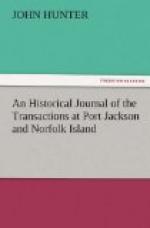In the night of the 16th of July, a serjeant, going the rounds, found the door of the spirit cellar open, and the centinel in the cellar, drawing off wine: this man, being ordered for trial, offered himself as an evidence for the crown, and charged two of his comrades with having frequently robbed the store, of which there was not the least doubt: however, the only evidence against these men being that of an accomplice, it was not sufficient to convict them, and he saved his own life by being admitted as an evidence for the crown. He was afterwards tried by a batallion court-martial, (as being a marine, he could not be tried by a general court-martial) and sentenced to receive corporal punishment, and to be drummed out of the corps. The men he had accused were the two who had been charged with robbing the store at Rose-Hill, by one of those marines who suffered death for robbing the store at Sydney in 1788, at which time, likewise, they escaped, the only evidence against them being an accomplice under sentence of death.
The rice which they received from Batavia was not of the best kind, and was very full of dirt and wevil when landed; and the wevil had now increased to such a degree that a very considerable quantity of rice was destroyed: indeed, what remained had been thought too bad to issue to the garrison, had the stores admited of its being given to the hogs. Five pounds of this rice were estimated as only equal to two pounds of flour, with respect to the nourishment it afforded, and this estimation was deemed pretty just.
It being the intention of government, that as the time for which the convicts were sentenced, expired, they should be permitted to become settlers; those who chose to accept this bounty were received as such, and lands were granted them in the following proportion; viz. Thirty acres to the single men, fifty acres to those who were married, and ten acres more for every child. It had been proposed to victual and cloath them from the public store for twelve months, from the time they became settlers; but to encourage those who first offered themselves, Governor Phillip promised to cloath and support them for eighteen months from the public stores: they were to have the necessary tools and implements of husbandry, with seeds and grain to sow the ground the first year; two young sow pigs were also to be given to each settler, which was all the governor’s stock would afford, and it has already been observed, that they had no live stock in the settlement belonging to the crown. On these conditions, twenty-seven convicts were admitted settlers; twelve of them were fixed at the foot of Prospect-Hill, four miles from Parramatta, and fifteen, at some ponds, an eligible situation about two miles to the northward of those settlers who were placed on the creek leading to Parramatta.




